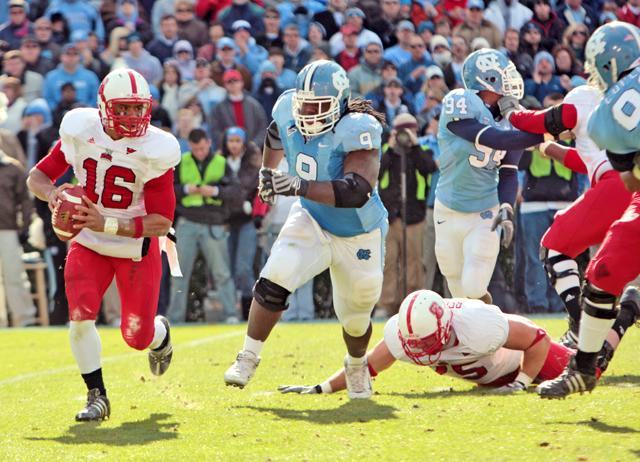
© 2010 Student Media
Russell Wilson, a redshirt freshman quarterback, scrambles to get the ball away from UNC's defensive tackle Marvin Austin during the game at Kenan Stadium in Chapel Hill, N.C., on Saturday , Nov. 22, 2008. The NCAA is investigating Austin for policy violations.
Use of social media by college athletes is prompting increased scrutiny from University officials charged with enforcing NCAA policies.
Steve Kirschner, the associate athletics director at UNC-Chapel Hill, could only confirm NCAA officials had been in Chapel Hill and on their campus to speak with student-athletes.
“NCAA had some representatives on our campus last week and they did speak to some of our student athletes, and that’s all I can say,” Kirschner said.
The News & Observer reported on July 20, the possible link between defensive tackle Marvin Austin’s Twitter account and the NCAA questioning. Neither the NCAA nor UNC-CH has confirmed whether the account prompted the investigation. Austin’s Twitter, ANCHORMANAUSTIN, has been disabled.
Michelle Lee, associate athletics director for compliance, explained the Compliance office at N.C. State helps student-athletes make sure they do not break any of the NCAA’s rules. Part of that means following the University’s guidelines for the use of social networking sites posted on the Compliance office website.
“We do several different things to help make sure our student-athletes know what is expected of them. We meet with each team individually in the fall to discuss NCAA regulations,” Lee said. “In the fall, we discuss agents, amateurism, drug testing and gambling. In the spring we meet with each team again individually to discuss the same things we discussed in the fall as well as summer issues.”
The Compliance office also has a Facebook page with more than 600 fans.
“While we don’t require student-athletes to like the Facebook page, a lot of the student-athletes do like it. It gives them another reminder of how to get up with the Compliance office and that we are here to answer any question,” Lee said.
According to Lee, student-athletes, as well as coaches, know the consequences of social media.
“They know this stuff, we kill them with it,” Lee said. “Every time we see them, we’re drilling them with it.”
Lee said there are three topics which routinely top the list of most important to cover with the student-athletes.
“Agents, amateurism and gambling are small things that can get our student-athletes into a lot of trouble,” said Lee. “Those are the main things we drill at the team meetings, and in the small settings that all incoming student-athletes have to attend.”
Student-athletes are not allowed to receive any benefits from agents. According to Lee, that includes pay, a meal or a ride, even if it’s “just up the street.”
“Student-athletes are free to talk with agents at anytime as far as the NCAA is concerned. Each sport might have specific times agents can and cannot talk with student-athletes,” Lee said. “The University requires all agents that want to talk with our student-athletes to register with us, and we ask them to let the Compliance office know when they are talking to a student-athlete, and send any paperwork through our office.”
Amateurism is another of the things that can pose a problem. According to Lee, amateurism deals more with the concept of “pay-for-play.”
“Student-athletes are not allowed to receive any pay or benefit while they are playing. Student-athletes cannot use their name, picture or appearance to promote anything or receive any pay. This rule is why student-athletes do not model or promote certain products,” Lee said.
Student-athletes are also not allowed to gamble on any sport with an NCAA championship.
“All staff associated with athletes are not allowed to gamble in regards to any level of any sport where the NCAA has a championship,” Lee said. “This includes professional level all the way down to pee-wee level.”
Lee said the Compliance office stresses to student-athletes that they are the ones impacted.
“The main thing we tell the student-athletes is ‘It’s you that’s affected. It’s you that can’t play in the game on Saturday,’ in regards to following NCAA rules,” Lee said. “The student-athletes should know there is always someone available to answer their questions, whether it’s their coach, sport administrator or someone from the Compliance office.”
According to David Horning, the senior associate athletics director, the education programs in place at the University do a good job.
“The compliance programs do a good job in monitoring. That’s really all we can do,” Horning said. “We put safeguards in place. Everyone in higher positions are concerned that agents know they need to stay away from our eligible student-athletes.”